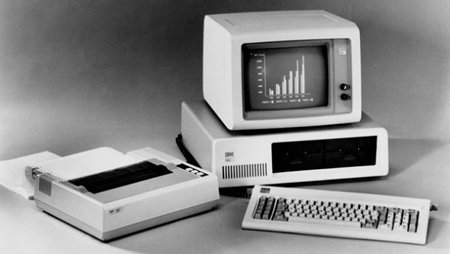Thirty years later, the personal computer’s obsolete, IBM PC designer says
Aug 10, 2011 — by LinuxDevices Staff — from the LinuxDevices Archive — 1 viewsAug. 12 is the 30th anniversary of the IBM Personal Computer — generally seen as having launched PCs into the mainstream of technological advancement. But now, one of the system's original designers claims in a blog posting, PCs are “going the way of the vacuum tube, typewriter, vinyl records, CRT, and incandescent light bulbs.”
Those of us who were around at the time know that IBM's original PC (model 5150) was not the first personal computer. Notable antecedents included the Apple II, the Commodore PET, the Osborne 1 — this author started out lugging one of them and still has the elongated arm to prove it — and the Tandy TRS-80.

IBM's original PC, model 5150
However, because of IBM's marketing muscle, adoption of an open architecture, and use of an operating system that Microsoft was left free to sell to others, its PC — introduced in New York on Aug. 12, 1981 — was the one that really brought the technology into businesses globally. (Columbia Data Products introduced the first IBM PC "clone" in June 1982, and Compaq announced its eponymous portable in November of the same year.)
Subsequently, PCs changed the world, as no one could reasonably disagree. But in an Aug. 10 blog posting, Mark Dean — one of the dozen engineers who designed the IBM PC — argues that PCs are "no longer at the leading edge of computing. They're going the way of the vacuum tube, typewriter, vinyl records, CRT, and incandescent light bulbs."
"When I helped design the PC, I didn't think I'd live long enough to witness its decline," Dean adds. According to Dean, IBM was "in the vanguard of the post-PC era" when it left the personal computer business in 2005. "I personally have moved beyond the PC as well," he stated. "My primary computer now is a tablet."


IBM's Mark Dean (left) says PCs are obsolete, while Microsoft's Frank Shaw (right) isn't so sure
According to Dean, "PCs are being replaced at the center of computing not by another type of device — though there's plenty of excitement about smartphones and tablets — but by new ideas about the role that computing can play in progress. These days, it's becoming clear that innovation flourishes best not on devices but in the social spaces between them, where people and ideas meet and interact."
Fleshing out the latter on a personal level, Dean notes that after more than a decade in IBM Research, he's now IBM's chief technology officer for IBM Middle East and Africa, focused on developing Africa's IT skills and computer science workforce.
"While the PC revolution has had a tremendous impact on the world, I believe that the work that IBM and others are doing in Africa could have an even bigger impact over the long haul," he writes.
More of a PC-plus era?
A different perspective is provided in another Aug. 10 blog posting by Frank Shaw, Microsoft vice president for corporate communications: "The introduction of the IBM PC was a defining moment for our industry. Once IBM entered the market with a system running the Microsoft Disk Operating System, MS-DOS, our industry really began to realize the dream of a PC on every desk and in every home."
Shaw adds, "People sometimes ask me about what Microsoft thinks about the post-PC era. I prefer to think of it as the PC-plus era, since there will be 400 million PCs sold worldwide this coming year."
But, Shaw also notes, Microsoft's offerings go way beyond PCs. "On the device side, our software lights up … Windows Phones and Xbox-connected entertainment systems, and a whole raft of other devices with embedded processors from gasoline pumps to ATMs, to the latest soda vending machines, to name just a few."
Jonathan Angel can be reached at [email protected] and followed at www.twitter.com/gadgetsense.
This article was originally published on LinuxDevices.com and has been donated to the open source community by QuinStreet Inc. Please visit LinuxToday.com for up-to-date news and articles about Linux and open source.